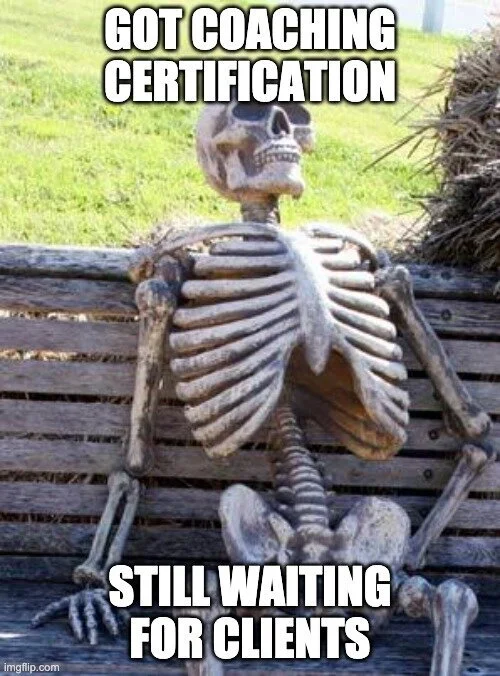How to Get Your First Three Coaching Clients (8 Easy Ways)
Everything changes when you get your first paying client.
You go from dreaming about building a coaching business to actually running one. From wanting to give your gifts to actually impacting lives. And from overthinking everything to actually getting paid to do what you love.
On the other hand - if you don’t know how to get life or business coaching clients, none of this will ever happen. And that's a shame. Because there are likely people out there who would benefit from your support.
Unfortunately, there isn't much good advice out there about how to market yourself as a coach. And the advice that you do find doesn't always work. Sometimes gurus will tell you to to do something one way even though that's not what worked for them.
Don’t be this guy. Learn how to find clients for your coaching business.
Read more about why you should keep things simple in the beginning: If You're Making Under 5k Per Month As A Coach, Don't Build Systems (Do This Instead)
Instead of just giving you my opinion, I decided to reach out to some of the most successful coaches I know and figure out exactly how they got started.
I asked them...
How Did You Get Your First Three Coaching Clients?
Why three? It's not a random number. Three is the tipping point for most coaches. It demonstrates that you have real traction and that this coaching thing isn't just a fluke.
Getting three long-term clients is what allowed me to leave my job, start coaching full-time, and later break six figures in revenue. So I know what a difference those first three clients can make for your income and your confidence.
Here’s the breakdown of which marketing strategies were most popular among the 27 successful life and business coaches that I surveyed:
Number of Mentions Per Strategy
For example, 8 of the experts mentioned offering free coaching as one way that they got their first three clients.
Click below to jump to one of the top strategies:
👋🏽 1. Coach People You Know For Free
🙋🏽♂️ 2. Attend Networking Events
👩🏽💻 4. Blog, Podcast, or Make Videos
🖥 5. Use Social Media Strategically
📄 8. Put Together an Ad or Flyer
Take a free quiz to figure out what the best strategy is for you:
I ran a live panel with six of the experts from this post going deeper into how they got their first three coaching clients. They also gave advice to new coaches around niching, pricing, and more. Check it out below:
👋🏽 1. Coach People You Know For Free
Challenge yourself to have 30 complimentary conversations. Then offer to continue working with them on a paid basis or ask if they know anyone else who might be interested. Instead of just coaching your heart out and hoping people will sign on with you, I recommend being a little bit more strategic…
First, choose a specific problem that you can work on with potential clients. Here’s a list of the most profitable coaching niches for you to choose from. This specificity makes people more eager to try out free coaching because they understand how it could help them.
Then, put together an invitation to your existing network for free coaching. You can put this out on social media or email people directly that you know (I recommend doing both). Here’s a video of my putting together an invite like this:
Next, conduct those free calls using my 3C Sales System. Clarity their situation, desires, and obstacles. Connect what they want to what you’re able to offer. Then Close the loop by helping them invest in themselves long term.
Read more about how to sell coaching services: 3 Simple Steps To Enrolling More Clients (Without Feeling Icky).
If you do this right, you can expect to enroll one out of every four clients that you offer your coaching to. This is how I got my first 5 high paying coaching clients.
“My first clients I just did coaching for free in exchange for testimonials and experience. The ones after that came mostly from my email newsletter or live workshops I did. But I never really pushed the one on one work because my main business model was about doing workshops.
What made them want to hire me was that they trusted me. They understood something of my take on marketing. They felt safe with me and trusted my approach. They'd been following me for a while or liked what they learned in the marketing workshop but they wanted some help in applying it. I don't think people really understand this fully. You can teach so much. You can be so clear and still, people will want your help to implement.”
“I fell backward into my first three clients, largely because I wasn't intending on being a coach. I was simply working with people and helping them get stuff done because they were friends I had made via the internet.
I was doing it on the side of two other careers, and at a certain point, they asked how they could get more regularly attention from me and how much it'd cost. We worked through a lot of "I don't knows" and "let's see how it goes", but those relationships turned into my first three paid clients. Were it not for the persistence and pressure from one of them, I may not have ever went public with coaching as a service, as well.”
“I coached my fucking ass off for free. 😁”
“My first clients asked for my help after I made an observation that acknowledged and validated their situation.”
🙋🏽♂️ 2. Attend Networking Events
During COVID, many of the networking groups that used to happen in person transitioned to meeting online. For example, Toastmasters is a public speaking group where you can now meet potential clients without ever leaving your home.
There are three things to focus on if you want to get clients from networking events. First, put some thought into how you introduce yourself and consider inviting people to a free coaching session at the end. Second, form genuine connections with other members of the group by being curious about what they do. Finally, make sure you have a way to follow up with specific people you meet who might be interested in working with you.
Personally, I don’t recommend going to networking events with the sole intention of getting clients. Yes, choose events that your potential clients are likely to attend. But when you’re there, focus on what you can give to the other members. Otherwise you can come off as a bit needy.
“I'm always hearing from new coaches that they don't know where to meet clients, but I meet clients everywhere I go.
My first three clients were people I met at my Buddhist temple, startup events, and social gatherings. They hired me not because my pitch was great, my packages were well designed, or my website was beautiful. They hired me because I showed up with an authentic desire to serve.
If you want to find clients everywhere you go, find a way to serve everyone you meet in a way they'll never forget.”
“Right out of the gate I was so excited about being a life coach in training that I would go to hipster coffee shops and strike up conversations with strangers.
I’d be curious about them and their lives, tell them my story, and offer a 15-minute initial chat.
Most people said “no” and enough said “yes” to chats that turned into full exploratory sessions, that turned into my first 7 (low) paying clients, which gave me the faith to take the leap from my day job, before I was even fully certified as a coach.
Looking back on this, the whole thing seems so hopelessly naive, and I really got my ass kicked those first few years in business. But that initial innocent enthusiasm was apparently disarming and appealing enough for my first clients to say “yes.”
My advice – be courageous, get out there, and have some conversations!”
“I got my first three coaching clients by attending networking events, having good conversations, then recommending a follow up call. On the call, we discussed coaching options and packages, and I signed them up.”
🔊3. Speak Or Run A Workshop
This is probably the fastest way to get coaching clients. As a speaker, you are instantly perceived an expert. The workshop can be online or offline, free or paid. Invite the audience to a complimentary strategy session at the end by saying, “If what we covered today was helpful for you, and you’d like to talk about how to apply it in your specific situation, then I’d like to offer you each a complimentary strategy session with me.”
Note: It can be a lot of work to set up your own event. If you already have an audience of some sort that you can invite to a workshop, then watch this video interview I did with my event manager to learn how it all works:
If you don’t currently have an audience, then I’d recommend finding a way to tap into somebody else’s audience. That way they can fill the workshop for you and you can just focus on the presentation.
Look up existing groups that regularly put on workshops in person or online. For example, some of my first few clients came from putting together a positive psychology workshop for an adult learning group (sort of like a Meetup group) in Washington, DC that was regularly looking for new guest experts.
“I was a corporate trainer at the time and they saw me present a seminar. They made the assumption that I must also be a good coach, but they were wrong. Oh well, you have to start somewhere!”
👩🏽💻 4. Blog, Podcast, or Make Videos
Content marketing is usually viewed as more of a long-term game. You write blog posts, make videos, or record podcast interviews in the hopes that your potential clients will find them. But sometimes the results happen sooner than you expect.
For example, one of my first coaching clients came to me after reading a blog post I wrote about marketing. I have no idea how she found it, since I didn’t know anything about SEO at the time, but the article was apparently helpful enough for her that she contacted me through my website. We had a conversation and I landed her as a client.
The great thing about content marketing for a coaching business is it allows you to build authority before ever speaking with a potential client. Selling coaching is a lot easier when you have that authority built up.
I’d recommend choosing one format to start — writing, making videos, or podcasting — depending on your strengths. Whichever one comes most easily to you. Click the button below to narrow down your options:
“Client #1 was a friend of mine. She was an exact ideal client, so I reached out to her and asked her if I could coach her, for free. She eventually moved to a Pay What You Want option, and then became a full paying client!
Client #2 I met at a workshop. She asked a question and I knew I could help her, so I went up to her after and asked her if I could work with her.
Client #3 found me through my website. I started blogging and interviewing people right away, and within 4 weeks of launching my website someone found me through my site and hired me!”
“One of the best ways to get clients is not to think about getting clients. The alternative is to focus on getting better at understanding the problems and challenges your ideal clients are likely facing right now.
Then start helping them to solve those problems in small ways by blogging, podcasting or perhaps creating networking groups. When you show people how you can make a difference, they and others will find (and pay) you.”
“I wrote an article, and at the bottom I had a link to my free Facebook group at the time....
... the article went viral...
... and I had 13,000 people join my Facebook group...
... I found my first 3 coaching clients by connecting with people in that group.”
🖥 5. Use Social Media Strategically
You might love social media. You might hate it. But you can’t deny that it’s a great resource when you’re starting out as a coach.
Until you’ve built your own email list, your existing network on social media serves as your initial audience. And if you don’t have an existing network on social media, you can use existing Facebook or LinkedIn groups to meet potential clients and answer their questions.
One good method I’ve seen from the fitness coaching niche is Jonathan Goodman’s “Founding Client” strategy. It involves posting on social media 3x per day for 7 days. At the end of each post, you mention that you’re starting a new coaching program and need people to try it out at a reduced price. Here’s a video where I explain the whole thing:
“1. I saw someone ask a question on Facebook and offered to coach her for free.
2. Taught a free class to a very successful businesswoman's list and made an offer at the end.
3. Taught a free call and offered to coach all 200 people on the call for free.”
🤝 6. Generate Referrals
The key to generating referrals is to be very specific in what you ask for. Don’t say, “Hey, do you know anyone who wants coaching?” It’s too hard for people to sort through their mental rolodex and come up with a name.
On the other hand, when you ask to be connected with a specific type of person with a specific goal, it’s much easier for people to help out.
For example, when I say, “do you know any new coaches who want to fill their client roster?” it’s much easier for people to send someone my way.
This strategy can be combined with free coaching by asking people to share an invitation that you put out to your warm network. You can also ask your current or past clients for referrals by following the three steps in this video:
“I got my earliest clients by being known for a super specific niche topic - LinkedIn profile strategy - when hardly anyone else was into that. Word spread through referrals and I got my first joint venture webinar invite because of that reputation.
Once I got into bigger business coaching, I learned that just listening to the client was the biggest value add. Listening to what they were struggling with and where they wanted to be and guiding them through what needed to happen to get there. They actually figured out most of the steps themselves once I pointed out the themes in what they told me.”
🎟 7. Host Your Own Meetup
If you don’t want to attend someone else’s networking event, you can create your own using Meetup.com. These can be hosted in person or virtually - your choice. The key is to make your group topic specific enough that it will stand out to your ideal clients. At the end of your meetups, you can invite them to a free consult to help them with whatever your area of expertise is. Are you seeing a theme here? The key is getting people into a conversation where you can offer your coaching directly.
“My first client was my roommate. She paid me $25/session so that I could start practicing my new skills. She was wonderful for giving me her time every week, and man, did that experience with her help me get that first inkling that - YES - I CAN do this as a career.
My second and third clients came from meetups that I ran. I began running three meetups a month and slowly, a community started to gather. I would make sure that everyone had a powerful experience in those two hours, got WAY more vulnerable than they were expecting (and then far more connected to themselves and each other).
Then I'd let them know that I was available if they wanted to go deeper into whatever it was that they were working on in that meetup.”
“I hosted a local meetup every Thursday for guys who wanted to go out together and improve their social skills. What started as a meetup that only had 3 people every week grew to 30+.
Eventually people started asking me to coach them when they met me and saw the growth I was having. The key for me was going for coffee individually with people who were interested and asking them if they wanted to learn more about coaching. They would always say yes, and that gave me permission to go more into "sales."
Back then we didn't have Square, so I always met with them at a coffee shop next to a bank, so they could use the ATM to give me a deposit right then and there. Looking back that sounds a bit sketchy but it was essential for securing clients.”
📄 8. Put Together an Ad or Flyer
Right now Facebook ads are a very popular form of marketing. However, I don’t recommend them if you’re just starting out. Facebook ads require a lot of specialized knowledge and they work best once you already have a "sales funnel” built.
An easier alternative is to put together a local ad or flyer. For example, if you’re a health coach, you could drop off some flyers at your local chiropractor’s office. You could even put up a listing on Craigslist describing what you do. While it might seem a little bit crazy, a number of famous coaches got their start doing this exact thing.
Similarly to the Meetup strategy above, you’ll want to focus your advertisement on how you can help potential clients. Talk less about the coaching process and more about what problems you can help solve. Then give people a way to contact you.
“I got my first three coaching clients through a brochure in a bookstore in London in 1990 - they paid 33 pounds for two hours of my time and I thought I was raking it in!
After that it was mostly referrals and people who came along on trainings that I was teaching on who wanted to go deeper.
Nowadays they find me through my books, radio show, videos, etc. My fees did go up a bit, though... :-)”
“I knew that, to have any hope of snagging paying customers, I had to present people with who I was, what I did, and how I could help them with the problem they were facing. In short: I had to get the word out about my business! What creative, hi-tech, super trendy methods did I use to do this?
Client #1: Responded to a flyer I had posted in public places around town. The one she saw was posted in a coffee shop I frequented.
Client #2: Came in through a comment I posted on someone’s blog about quitting your job to pursue a passion-driven career.
Client #3: Contacted me after I emailed my entire professional network of 40+ women about my change in career path.”
“Gumtree (it's a UK equivalent of Craigslist).”
🤷🏽♀️ Free Quiz: Learn Your Best Way To Get Clients
So know you know the 8 easiest marketing strategies for new coaches.
While every expert above took their own unique path to three clients, they all have one thing in common: they got out there and offered their coaching to people. This is non-negotiable when you’re talking about how to get life coaching clients.
The next question is, which strategy should you choose? It can be a bit overwhelming at first.
To help you sort through your options, I’ve created a “Coaching Archetype” quiz.
Each Archetype has strengths and weaknesses. When you learn your Archetype, you’ll also learn which marketing strategies will work best for you.
Click here to take the quiz:



















